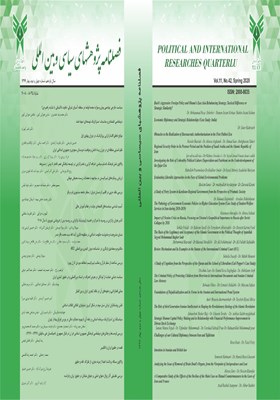واکاوی مساله برداشت اعضا از مرده مغزی، از نظرگاه فقه و حقوق
محورهای موضوعی : مجله پژوهش های سیاسی و بین المللیعلیرضا زارع میرک آباد 1 , حسین خنیفر 2 *
1 -
2 -
کلید واژه: کشف جرم, حقوق دفاعی متهم, قانون آئین دادرسی کیفری مصوب 1392, اساسنامه دیوان دائمی بین المللی کیفری,
چکیده مقاله :
علیرضا زارع میرک آباد[1]- حسین خنیفر[2] تاریخ دریافت: 18/8/1398- تاریخ پذیرش: 2/9/1398 چکیده با ایراد اتهام به شخص متهم، مشارالیه وارد فرآیندی از دادرسی کیفری می شود که یک طرف آن حکومت با تمام اختیارات و امکانات قرار دارد تا در برابر متهم بایستد و در طرف دیگر متهمی قرار دارد که در برابر قوای حکومتی ناتوان است در نتیجه باید به متهم این امکان داده شود تا به نحو مطلوب از خود دفاع کند. اگر سازوکاری اندیشیده نشود در واقع ستمی به ناحق به مشارالیه وارد میآید؛ برای ممانعت از این وضع، بایستی متهم از حقوق دفاعی مناسبی برخوردار باشد. مرحله کشف جرم به عنوان نخستین مرحله از فرآیند رسیدگی جرم از اهمیت ویژه ای برخوردار می باشد و تا حدود زیادی سرنوشت نهایی پرونده کیفری به این مرحله وابسته می باشد. بر این اساس عدم توجه به اصول دادرسی عادلانه و منصفانه به ویژه تضمین حقوق دفاعی متهم در مرحله کشف جرم می تواند سایر مراحل دادرسی کیفری را تحت تاثیر قرار دهد. معمولاً مقررات مربوط به حقوق متهم در قانون آیین دادرسی کیفری آورده می شود و در همه رسیدگی های کیفری مرعی می گردد. آیین دادرسی کیفری ایران نیز، در مواد مختلفی به حقوق دفاعی متهم پرداخته است؛ نظیر: حق آزادی، حق تفهیم اتهام، حق داشتن وکیل، لزوم حیثیت و کرامت انسانی و ... همچنین برای عدم رعایت این حقوق توسط سیستم رسیدگی کننده اعم از مقامات قضایی و پلیسی، ضمانت اجراهای کیفری در نظر گرفته شده است. [1] - دانشجوی کارشناسی ارشد، فقه و مبانی حقوق، دانشکده حقوق، دانشگاه تهران، تهران، ایران law.office.zare@gmail.com [2] - استاد و عضو هیات علمی، گروه حقوق، دانشکده مدیریت و حسابداری، دانشگاه تهران (پردیس قم) ، قم ، ایران: نویسنده مسئول khanifar@ut.ac.ir
Alireza Zare[1] Hosein Khanifar [2] Abstract: One of the most important medical issues that are reviewed and judged from the aspect of legal and jurisprudence is the issue of brain death. This category has a number of different issues. Including whether the person with brain death is actually dead? How is the situation in the perception of this person's organ? Is it just to remove equipment from the patient, or is it just the harvesting of the organs of the stuff that causes the definitive death of the person? From the point of view of jurisprudence and law, this issue seems permissible in some cases, and in some cases is prohibited. Since non-dead brain’s organs are of no use to the individual and the harvest of these organs does not harm him, but can save another person's life with the same organs, so in terms of religion and wisdom, this perception and connection to the comment is allowed. However, under the current circumstances, the judicial decree (fatwa) dispute and the lack of clarification of the various aspects of the subject matter have not yet been enacted, and if this legal vacuum persists, it will have severe consequences that will generally be irreparable. If a comprehensive law is passed to prevent this, save the lives of those in need and save on the costs of keeping two sick people (those with brain death and those in need), in cases of abuse of law and silence. Complaints are prevented because of a lack of law. [1] - M.Sc. Student, Jurisprudence and Fundamentals of Law, Faculty of Law, University of Tehran, Tehran, Iran [2]- Full Professor and Member of Official Faculty of Tehran University, Qom: Farabi Campus, Faculty of Management and Accounting, Qom, Iran: Corresponding Author
_||_

